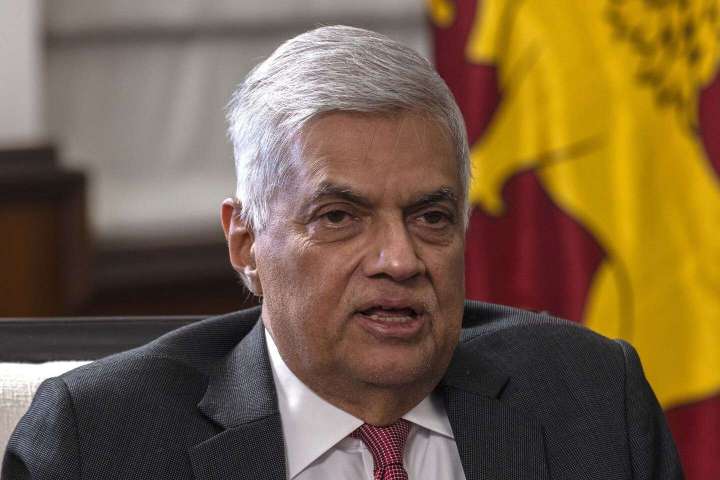COLOMBO, Sri Lanka — Sri Lankan acting president Ranil Wickremesinghe was selected Wednesday by Parliament to be the country’s new leader, after widespread protests ousted the unpopular Gotabaya Rajapaksa this month. His elevation appears likely to spark further backlash from Sri Lankans, many of whom see him as part of the political elite and an ally of the Rajapaksa government that brought the island nation to an unprecedented economic crisis.
Sri Lanka picks establishment figure as president, risking more unrest

Wickremesinghe was comfortably elected with 134 votes in the 225-member Parliament to serve out the rest of the term through 2024. He was backed by Rajapaksa’s Sri Lanka People’s Front party and was appointed prime minister in May after Rajapaksa’s elder brother, Mahinda Rajapaksa, resigned from that position.
For Sri Lankans hankering for political change, such a clearly status-quo outcome came as a disappointment. The protesters announced that their agitation will continue, a move that risks more unrest as Wickremesinghe has signaled his willingness to use force to maintain public order.
“We won’t give up,” said protester Rajeevkanth Rajkumar at the site of the months-long demonstrations. Wickremesinghe, he said, came “to save the Rajapaksas.”
Wickremesinghe hails from a prominent political family and has served as prime minister of Sri Lanka six times since the 1990s. He trained in law and was made a cabinet minister for the first time at age 28 in 1977, in a government led by his uncle, J.R. Jayewardene.
The new president tried to strike a conciliatory note after his victory, telling lawmakers that the people were asking for a new political culture. “I want to start work from tomorrow with you. Let’s all join together,” he said.
His opponent, Dullas Alahapperuma, said the country needs “healing.” A former journalist and a cabinet minister under Rajapaksa, he was backed by the principal opposition party.
“I hope the president and the new government will hear the cries of the people who are suffering,” he said.
Many opposition leaders said the current Parliament, where Rajapaksa’s party enjoys a majority despite the ouster of the president and prime minister, no longer reflects the people’s sentiments.
“The wish of the people was to form an all-party government without Ranil Wickremesinghe,” said Rauff Hakeem, an opposition leader. “There will be continuous unrest outside on the streets, and it will not subside.”
Wickremesinghe, who became acting president after Rajapaksa fled last week, declared a state of emergency before the vote, giving security forces wide-ranging powers. On Wednesday morning, security was beefed up around Parliament in anticipation of new protests.
In recent weeks, demonstrators stormed and occupied the homes and offices of the president and the prime minister demanding their resignations. Wickremesinghe had offered to step aside but ultimately did not. His private home was destroyed after a mob set it on fire earlier in July.
The protesters later withdrew from many of the buildings but have continued to camp at the presidential office. On Wednesday morning, dozens of protesters sat on the steps of the colonial-era building in a silent protest as they watched the Parliament vote on a large viewing screen.
“Even if [the vote is] over today, it’s not over. We have to ensure they follow what we want,” said Caryll Tozer, a women’s rights activist who participated in the protests.
Wickremesinghe denounced the protesters, calling them “fascists” for clashing with security forces on the streets of Colombo.
“We cannot allow people who want to override the Constitution to occupy the offices and houses,” he said in his capacity as acting president. “We have to protect the private citizens too.”
Few believe that Wickremesinghe will move to reduce the presidency’s expansive executive powers — a major demand of the protesters — given that the system was created by his uncle, Jayewardene. Under the Rajapaksas, the president’s authority was further strengthened, including the right to appoint the cabinet and judges.
“Gotabaya Rajapaksa is the embodiment of what could happen if an incompetent person is in charge of the presidency,” said Gehan Gunatilleke, a lawyer and political commentator. “The push to abolish [executive presidency] has never been greater.”
The political instability has put at risk critical negotiations with the International Monetary Fund over a bailout package. Sri Lanka is in the grips of a deep economic crisis, with severe fuel shortages bringing the country to a near standstill. Skyrocketing food inflation has left millions struggling for essentials and pushed many into poverty.
The priority for Sri Lanka must be “to get basic necessities in shortage right now to a level where people have enough energy and food to calm social instability,” said Kim Eng Tan, a sovereign analyst at S&P Global Ratings. After that, he said, the government could try to get the fiscal position in better shape and stabilize the economy.
While Rajapaksa fled to Singapore via the Maldives last week, other members of his family voted in the Parliament on Wednesday.
Many Sri Lankans blame the economy’s collapse on the mismanagement and policy decisions of the Rajapaksa family, which until recently held top positions in the government including the posts of the president, prime minister and finance minister.






